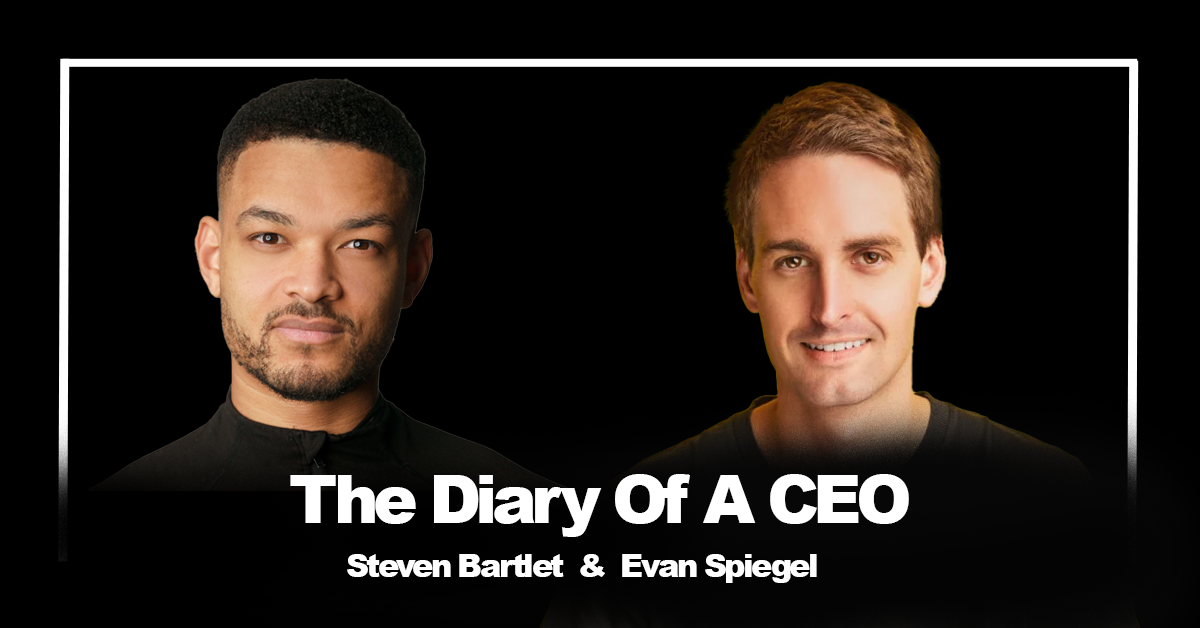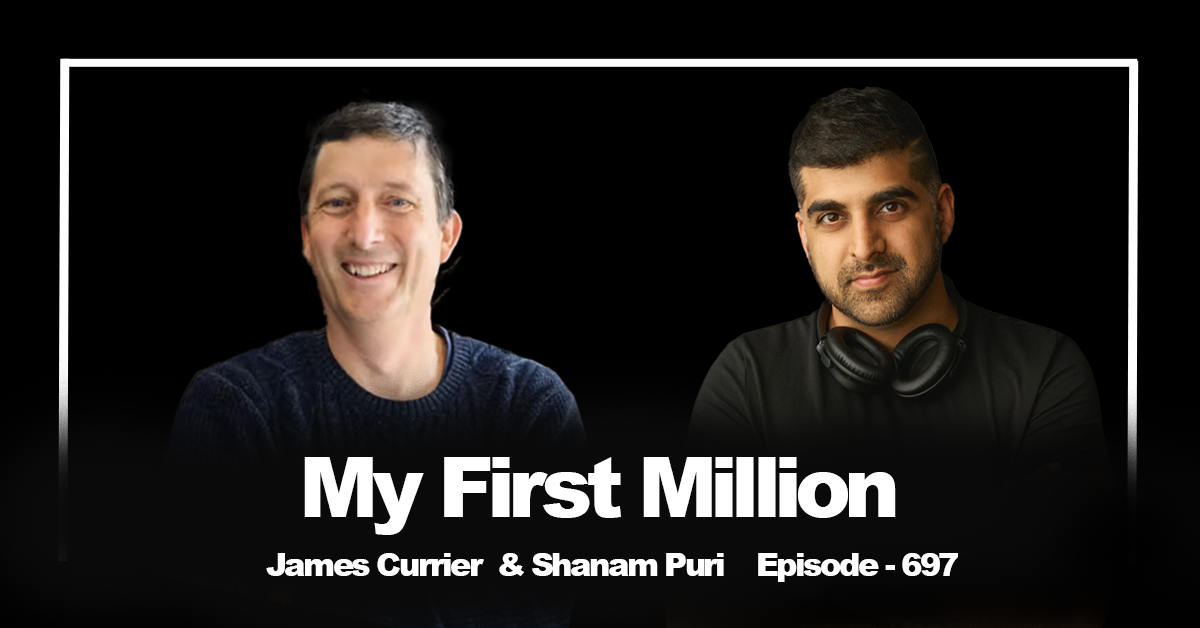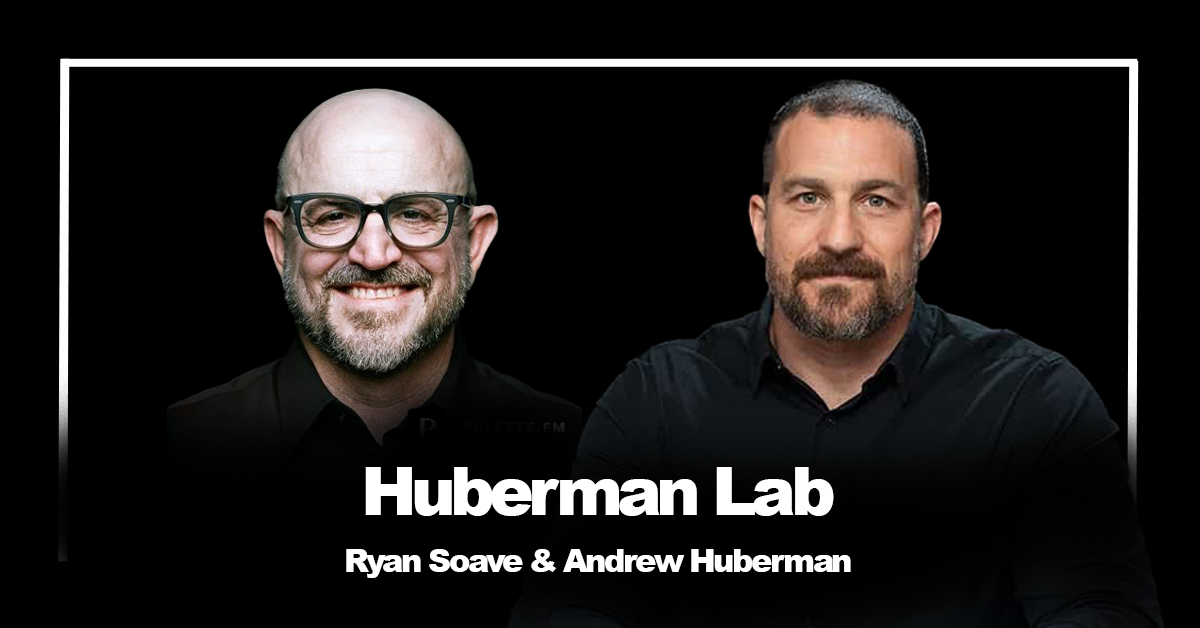This week, we’re diving into a rare conversation with Evan Spiegel, the co-founder and CEO of Snap Inc. Evan became the world’s youngest self-made billionaire at 25, famously turning down a $3 billion offer from Mark Zuckerberg just a couple of years after launching Snapchat.
Despite his immense success, Evan rarely does podcasts or public speaking. In this insightful discussion with Steven Bartlett, he pulls back the curtain on his formative years, the chaotic birth and explosive growth of Snapchat, his leadership philosophy, and how he views the future of communication, competition, and AI.
Here are the key insights and lessons learned:
1. Early Life: The Seeds of an Inventor & Contrarian
- Introvert & Builder: Growing up, Evan was introverted and didn’t easily fit in. With his parents restricting TV time but encouraging reading, he developed a rich imagination and a love for building things – from fake hotels in the living room to eventually building his own computer in 6th grade.
- Empowerment Through Demystification: Successfully building his own PC demystified technology. Realizing that complex things often aren’t as hard as they seem sparked a curiosity: “What else can I build?”
- Early Contrarian Streak: Even as a kid, Evan showed a willingness to challenge convention, citing an example where he wrote an exposé on his school’s math program, pushing for improvements. This comfort with pushing against the status quo was an early indicator.
2. The Stanford Influence: Thinking BIG
- Product Design Principles: Choosing Product Design at Stanford taught him a systematic way to create: empathize with users, prototype solutions, and iterate based on feedback. It framed innovation not as a lightning strike, but a process.
- Shifting Ambition: A pivotal “Entrepreneurship and Venture Capital” class contrasted sharply with the cash-flow focus he’d seen growing up in LA. Stanford’s culture emphasized tackling massive opportunities with billion-user potential, funded by venture capital aiming for huge scale, even if the odds were long. This “swing for the fences” mindset was crucial.
3. The Birth of Snapchat: Failure, Feedback & Finding Product Love
- The “Future Freshman” Failure: Evan and his co-founder Bobby Murphy first spent 18 months building a feature-rich website to help kids apply to college. It failed. Key reasons: lack of personal passion (“we didn’t love the product enough”), a difficult user acquisition model, and facing entrenched competition (Naviance).
- Lesson 1: Speed & Feedback: The painful 18-month cycle taught them the critical importance of launching something simple quickly to get real user feedback, rather than perfecting in isolation.
- Lesson 2: Product Love Matters: Their lack of personal connection to Future Freshman meant they couldn’t fight through the inevitable challenges. This contrasts sharply with Snapchat, which they used constantly with friends from day one.
- Snapchat’s Genesis (Picaboo): The idea for disappearing photos (“I wish I could send a disappearing photo”) came from a friend, Reggie Brown. They built a simple prototype focused on fun, ephemeral communication – the opposite of polished, permanent social media profiles.
- Early Pivots: Initial feedback on “Picaboo” was harsh (“This makes no sense, you can just screenshot!”). Key inventions born from feedback:
- Screenshot Detection: A crucial early feature that built user trust and comfort.
- Captions/Drawing: Users wanted more ways to express themselves with the photo. Implementation focused on speed and ease (tap photo, keyboard pops up) rather than clunky social media norms.
- Organic Growth: Snapchat grew entirely through word-of-mouth – friends telling friends – driven by the fun and utility of visual communication.
4. The $3 Billion Facebook Offer: Vision Over Valuation
- Why They Said No: Despite the staggering offer (especially for 23-year-olds operating out of Evan’s dad’s house), they declined. The core reason: their vision and company ethos were fundamentally divergent from Facebook’s focus on curated perfection. They believed in offering an alternative way to communicate.
- The $10M Safety Net: Crucially, Evan and Bobby had each previously sold $10 million in stock during an earlier funding round. This financial security removed personal pressure (“I can buy a house, have a family”) and allowed them to genuinely “swing for the fences” with the business itself, making the $3B offer less personally life-altering.
5. Scaling Snapchat: Culture, Hiring & Leadership
- Culture Challenge: Scaling rapidly (from 20 to 2000 people) meant importing different cultures (Amazon, Google, Meta), which diluted Snap’s unique values. Evan admits they were too slow in defining and embedding their culture early on.
- Snap Values: Kind, Smart, Creative:
- Kindness is Essential for Creativity: Learned over time that a supportive culture where people feel safe sharing “crazy” ideas without fear of ridicule is vital for innovation. Differentiated “Kind” (direct, helpful feedback, even if awkward) from “Nice” (avoiding difficult truths).
- “No Brilliant Jerks”: A core belief championed by Bobby Murphy – truly smart/talented people shouldn’t need to be unkind.
- T-Shaped Leadership: Values deep expertise in one area (“I”) combined with broad business understanding and cross-functional collaboration skills (“T”). Generalists without deep expertise struggle to add value; deep specialists unable to connect struggle to have impact.
- Hiring for Adaptability: Prior experience is valuable, but the ability to adapt that experience to Snap’s unique context and evolve one’s perspective is more important than specific domain expertise or adherence to how other companies operate.
- Council: A communication practice borrowed from Evan’s high school. Small groups sit in a circle (emphasizing equality) and share based on prompts (“speak from the heart, listen from the heart, be spontaneous”). It fosters deeper connection and understanding, crucial for bridging gaps as the company grew.
- Fix Mistakes Quickly: Evan emphasizes it’s more important to make a decision and quickly fix it if it’s wrong, rather than getting paralyzed striving for the perfect decision. This embraces the feedback loop.
6. Competition, Copying & Staying Ahead
- Instagram Stories: While initially frustrating, Evan views Kevin Systrom’s candid admission of copying Stories as “admirable honesty.” He sees being copied by giants as validation.
- The Defense: Platform & Ecosystem: The strategy isn’t just to have features, but to build a platform with deep, hard-to-copy technology and an ecosystem. Snapchat’s AR rendering engine (Lens Core) and developer tools (Lens Studio) create a moat that’s much harder to replicate than a simple feature.
- Drawing Inspiration: Innovation involves drawing inspiration from others (Evan cites being inspired by Bytedance’s early ML-driven news app). The key is how you adapt and build upon ideas.
7. Content Moderation, AI & The Future
- Values-Based Moderation: Snapchat proactively removes harmful content (pornography, extreme violence) based on its values, arguing this creates a more comfortable environment for self-expression, unlike platforms taking a more hands-off approach. Evan frames this as a First Amendment right of a private platform to choose its content, not censorship.
- AI as a Tool for Learning: Evan is excited about AI’s potential, especially for creativity and learning. He sees it as a powerful “thought partner” for brainstorming and iterating. The biggest potential might be in training people to ask better questions.
- Navigating Tech Trade-offs: Acknowledges new technologies always have trade-offs (like social media’s impact becoming clear years later). The key is navigating the human adoption curve thoughtfully.
- Creativity is the X-Factor: In the age of AI, nurturing human creativity (visualizing, expressing) becomes paramount. Evan encourages this deeply, seeing it as fundamental.
Final Thought:
Evan Spiegel provides a fascinating blend of visionary thinking, hard-won practical experience, and a unique philosophical approach to building a business. His emphasis on product love, rapid feedback, cultural clarity, and relentless adaptation offers valuable lessons for anyone navigating the turbulent waters of modern entrepreneurship and technology. His belief in the power of kindness and creativity as core business drivers is particularly refreshing.
Listen to the full episode here: [Link to Episode]
Until next time,
The Podcast Notes Team





